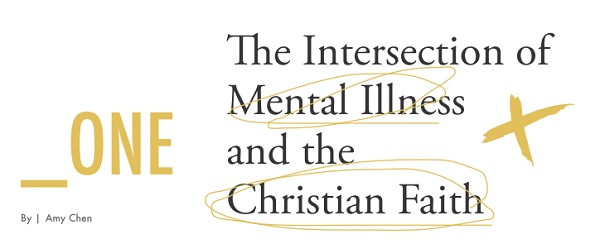The Intersection of Mental Illness and the Christian Faith
By Amy Chen

Mental illness and mental health is a topic that has been considered taboo for a long time in general society. In order for professionals and personal supports to adequately walk alongside individuals with mental health challenges, it would be helpful to learn about what the Christian faith has to say about this topic. Mental health issues can include depression, anxiety, personality disorders, schizophrenia, and psychosis, just to name a few. For the purpose of this article, most of the focus will be on depression and anxiety because they are common phenomena for the average layperson to understand. Depression is something that I myself have struggled with since my early college years, and it can be life-dominating because it affects every part of our being. It has affected and still affects my ability to keep up with my daily routine, maintain relationships, and even focus on my faith in Christ.
When depression or anxiety emerges, it is easy to see that the person is suffering in one way or another. I remember a night in which I was struggling mentally and could not bring myself to do anything, not even get ready for bed. I was staring into space and couldn’t escape from the deep hole I was in. I was trapped in my loneliness and discontentment with the way my life was turning out. I simply couldn’t see the tiniest glimmer of hope.
Not surprisingly, the Bible addresses suffering (Welch, p. 106). Scripture talks about the Suffering Servant, how God’s grace is sufficient and how his power is made perfect in weakness (2 Corinthians 12:9). At the same time, Scripture addresses that we should, as the body of Christ, “Rejoice with those who rejoice; weep with those who weep” (Romans 12:15). So as the body of Christ, we should walk alongside these individuals who might be suffering from clinical depression or anxiety. In times of suffering and weaknesses, we need someone who really cares to be there for us. This person need not be someone who we are close to, but perhaps just anybody with compassion and willingness to listen to our struggles. When I was going through my darkest days a few years ago, a pastor entrusted a sister from church to visit me. She was someone who I never met before, but because of her compassion and caring heart, she was able to offer me comfort. She saw that I needed spiritual nourishment and she provided me those very things with her presence and time. For the most part, she shared the joy of Christ with me, and how we can find wholeness in him.
It is during these dark hours of our lives that we need someone who can see us as whole persons with both physical and spiritual needs. This may come in the form of a professional counselor, a friend, or a family member. But more importantly, it is crucial that the local church steps in, because the body of Christ is supposed to be there for brothers and sisters.
The biblical truth is that we were created to be dependent on each other and on God. We were created to desire companionship. We were never meant to walk this journey of life independently. Being surrounded by people with mental health struggles, I have found that a lot of people find themselves lonely when they are going through such struggles. Genesis 2:18 says, “Then the Lord God said, ‘It is not good for the man to be alone. I will make a helper as his complement.’” God’s word addresses the loneliness piece that can sometimes be one reason a person might feel depressed.

Maurice Roberts also points this out:
Christians are lonely. They are scattered far from one another and are often kept exceptionally busy at their secular jobs. Consequently, they are spiritually very tired by the time they meet with one another, and are chronically in need of that comfort and nursing, which only Christian company is able to give them. (p. 156)
As human beings, we need companionship from others, and the Christian faith affirms that idea. So, it is not a bad thing that our hearts seek comfort from others. God also created us to be dependent on him (John 15:5). This is contrary to the public perception that we are strong enough to get through life on our own if we try hard enough.
Sometimes, a person is depressed because he or she is finding life unfulfilling. Because the heart is not getting these desires for a “fulfilling” life met, a person can slip into a deep depression. Some individuals want to seek self-glorification through more money, better looks or more friends (Welch, p. 123). A lot of people are depressed because they can’t get a particular job or they aren’t in the group of “popular” people. I know for myself, when I don’t fi t in with a particular crowd, I sometimes get very depressed. And if I fail in the standards I set for myself, I also become despondent and feel as though there is nothing else worth living for. It is as though these wants are my idols, and I worship and serve these idols. It may just be that those wrestling with depression cannot see the wholeness or peace we can have in Christ Jesus. Worship comes directly from the heart, so when a person is depressed, we sometimes get answers as to what really lies in the heart.
Depression can reveal a lot about a person’s heart and its desires, and the same goes for anxiety. Even though there may be a chemical imbalance with anxiety disorders, it doesn’t mean that we should overlook other potential factors, such as the desires of the inner heart. Anxiety says a person is worried about not getting what his or her heart desires. As a result, the heart feels uncertain and not at ease. If we delve into this issue more deeply, we can see this anxious person is not confident of what will come next. I get anxious all the time about how my schooling and career will turn out, not knowing that God is in control. However, God gives us confidence in the hope that we have from Jesus Christ defeating death through his resurrection (Hebrews 10:19). We should be content not because the future is known to us, but because it is known by God.
As brothers and sisters in the body of Christ, we must realize the problem is not so simple as chemical imbalances, nor solely victimhood, nor the fault of the sufferer. Sin and its effects are both simple and complicated. One thing we know, however, is that Jesus calls us to love one another. The one wrestling with depression or anxiety needs the body of Christ to join with him or her in being attentive to the Holy Spirit for when to listen and for when to speak.
The Christian faith says that a person’s worth is not determined by the works he or she has done, but instead, a person is already a person of worth because of the life Jesus lived. The whole of Scripture addresses that we are declared righteous before God because of what Jesus has done on the cross. Jesus is our Meaning and Satisfaction. He is our Portion. This means that the sufferer must cling to Jesus and the truth he brings and that the body must seek out and love the one whom Jesus has declared precious.
Works Cited
Roberts, Maurice. The Thought of God. The Banner of Truth Trust, 1993.
Welch, Edward T. Blame It on the Brain?: Distinguishing Chemical Imbalances, Brain Disorders, and Disobedience. P & R Pub., 1998.


 Amy Chen currently lives in Wakefield, Massachusetts. She has a Bachelor of Science in Health Sciences from Stony Brook University in Long Island, New York. She enjoys writing, discussing mental health topics, and writing codes for computer programs.
Amy Chen currently lives in Wakefield, Massachusetts. She has a Bachelor of Science in Health Sciences from Stony Brook University in Long Island, New York. She enjoys writing, discussing mental health topics, and writing codes for computer programs.